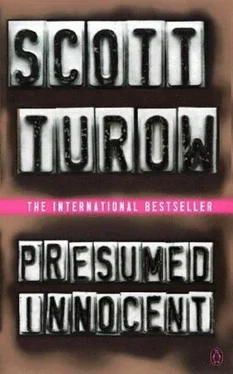Scott Turow - Presumed innocent
Здесь есть возможность читать онлайн «Scott Turow - Presumed innocent» весь текст электронной книги совершенно бесплатно (целиком полную версию без сокращений). В некоторых случаях можно слушать аудио, скачать через торрент в формате fb2 и присутствует краткое содержание. Жанр: Детектив, на английском языке. Описание произведения, (предисловие) а так же отзывы посетителей доступны на портале библиотеки ЛибКат.
- Название:Presumed innocent
- Автор:
- Жанр:
- Год:неизвестен
- ISBN:нет данных
- Рейтинг книги:4 / 5. Голосов: 1
-
Избранное:Добавить в избранное
- Отзывы:
-
Ваша оценка:
- 80
- 1
- 2
- 3
- 4
- 5
Presumed innocent: краткое содержание, описание и аннотация
Предлагаем к чтению аннотацию, описание, краткое содержание или предисловие (зависит от того, что написал сам автор книги «Presumed innocent»). Если вы не нашли необходимую информацию о книге — напишите в комментариях, мы постараемся отыскать её.
Presumed innocent — читать онлайн бесплатно полную книгу (весь текст) целиком
Ниже представлен текст книги, разбитый по страницам. Система сохранения места последней прочитанной страницы, позволяет с удобством читать онлайн бесплатно книгу «Presumed innocent», без необходимости каждый раз заново искать на чём Вы остановились. Поставьте закладку, и сможете в любой момент перейти на страницу, на которой закончили чтение.
Интервал:
Закладка:
Over his shoulder, Stern looks at me severely.
Suddenly ahead of where he expected to be, Nico sits down.
"Cross-examination."
Sandy advances on Eugenia. He speaks as soon as he reaches his feet, not waiting to arrive at the podium. He has maintained the same scolding expression which only seconds ago he turned on me.
"For whom do you work now in the prosecuting attorney's office, Ms. Martinez?"
"Work?"
"Whose typing do you do? Whose phones do you answer?"
"Mr. Molto."
"This gentleman? The prosecutor at the table?" Eugenia says yes. "When Mr. Sabich was forced to take leave because of this investigation, Mr. Molto advanced to Mr. Sabich's position, is that right?"
"Yes, sir."
"And that position is one of considerable authority and influence in the P.A.'s office, is that right?"
"Number-two man," answers Eugenia.
"And Mr. Molto was in charge of the investigation that brought him Mr. Sabich's job?"
"Objection!"
"Your Honor," Sandy says to the judge, "I am entitled to develop bias. The woman is testifying before her employer. Her perception of his motives is important."
Larren smiles. Stern is developing more than that, but his excuse will pass. The objection is overruled.
The court reporter rereads the question and Eugenia answers yes. Sandy, in his opening, touched only lightly on the election and the change of administration. This is his first attempt to develop rivalry for power as a theme. It will answer, in part, his question to the jury in his opening statement about why the prosecutors might move ahead on an insufficient case. It had never struck me that he might do that by picking on Molto rather than Della Guardia.
"Now, in the course of investigating Mr. Sabich, did Mr. Molto ask you to speak to a police officer about what you remembered of Mr. Sabich's relationship with Ms. Polhemus?"
"Sir?"
"Didn't you speak in May to Officer Glendenning?" Tom is in and out of court, but right now he is here and Sandy points at him, seated in uniform at the prosecutor's table.
"Yes, sir."
"And you knew that the investigation was a very important one, particularly to your boss, Mr. Molto, did you not?"
"Seemed like."
"And yet, madam, when you were asked about Mr. Sabich's relationship with Ms. Polhemus, you never told officer Glendenning that you heard Mr. Sabich call Ms. Polhemus 'my angel,' did you?" Sandy says it with a special cold emphasis. He appears furious with the perjury. He has Glendenning's report in his hand.
Eugenia suddenly recognizes that she is trapped. She gets a slow, unwilling look and sags a little. She probably had no idea that the defense would know what she said before.
"No, sir," she says.
"You didn't tell Officer Glendenning that you recalled Mr. Sabich using any term of endearment, did you, madam?"
"No, sir." She is brooding; I have seen this look a hundred times. Her eyes closed; her shoulders draw around her. This is when Eugenia is at her meanest. "I never said anythin like that."
"Not to Mr. Glendenning?"
"No time."
Sandy, before I do, recognizes where Eugenia is going. She has thought of a way out. He walks a few steps toward her.
"Didn't you testify five minutes ago, madam, that Mr. Sabich called Ms. Polhemus 'my angel'?"
Eugenia draws herself up in the witness stand, fierce and proud.
"No way," she says loudly. Three or four of the jurors look away. One of them, the man who is learning about hamburgers, laughs out loud, just one little hiccup.
Sandy studies Eugenia. "I see," he finally says. "Well, tell me, Ms. Martinez, when you answer Mr. Molto's phone these days do you listen in on his conversations?"
Her thick eyes go sidelong with contempt. "Nope," she says.
"You would not listen a moment longer than you had to in order to recognize that someone is on the line, is that not correct?"
This, of course, is Eugenia's problem. She probably heard a good deal more pass on the telephone between Carolyn and me than she has disclosed. But even with the P.A. and his chief deputy prosecuting the case, she cannot admit to eavesdropping. The winds of fortune change too quickly, and Eugenia, a bureaucratic animal, knows that such an admission would eventually be the long-awaited dynamite to dislodge her from her sinecure in civil service concrete.
"What you heard, you heard in an instant?"
"That's all."
"No more?"
"No, sir."
"And you tell us it was 'nice-like"? Were those not your words?"
"What I say, yes, sir."
Stern comes and stands beside Eugenia. She weighs about two hundred pounds. She is broad-featured and surly, and even dressed in her finest, as she is today, she still does not look very good. Her dress is much too loud and is stretched tight over her bulk.
"You base this answer," he asks, "on your experience in such things?"
Sandy is poker-faced, but a couple of the jurors get it. They look down as they smile. Eugenia certainly gets it. Killers' eyes do not grow colder.
Stern does not ask for an answer.
"And this conversation about meeting at Ms. Polhemus's apartment took place last September, you say?"
"Yes, sir."
"Do you remember that Mr. Sabich and Ms. Polhemus tried a case together as co-prosecutors last September?"
Eugenia stops. "Uh-uh," she says.
"You do not remember the McGaffen case? A child, a little boy, had been hideously tortured by his mother? His head put in a vise? His anus burned with cigarettes? You do not remember Mr. Sabich securing the conviction of this-" Stern makes it look as if he is searching for a word, before he ends with "woman?"
"Oh, that one," she says. "I recall."
"The McGaffen case, I take it, was not recalled in your discussions with Mr. Molto?"
"Objection."
Larren ponders.
"I will withdraw it," says Stern. He's made his point to the jury.
Prosecutor Molto seems to be taking it in the shorts so far today. He has the tag for the missing glass. He has inspired Eugenia's perjury.
"Ms. Martinez, do you remember how warm it was in Kindle County last year around Labor Day?"
Her brows close. She has taken enough of a beating that she is trying to cooperate.
"Past 100 two days."
"Correct," Stern says, improperly. "Is the P.A.'s office air-conditioned?"
Eugenia snorts. "Only if you believe what they say."
Laughter throughout the courtroom. The judge, the jury, the spectators. Even Stern finally smiles.
"I take it you try to leave as soon as the day ends when the heat is like that?"
"You got that right."
"But the prosecutors, when they are in the midst of a trial, do not leave at the end of the day, do they?"
She looks at Sandy suspiciously.
"Isn't it commonplace, in your experience, for the deputy P.A.'s to prepare for the next day of trial in the evenings?" Stern asks.
"Oh yes."
"Now, madam, would you not prefer to work in air conditioning rather than the P.A.'s office on a very warm evening?"
"Objection," Nico says. It's largely pointless.
"I'll let it stand."
"Sure would."
"You don't know of your own knowledge that Ms. Polhemus's apartment was air-conditioned, I take it?"
"No, sir."
"But you do know that the riverfront is much closer to the P.A.'s office than Mr. Sabich's home in Nearing?"
"Yes, Sir."
Whatever the jury makes of Eugenia, it is probably favorable compared to their opinions of Mrs. Krapotnik, who is called next. Her few minutes on the witness stand achieve the level of pure burlesque. Mrs. Krapotnik is a widow. She does not say what Mr. Krapotnik died from, but it is hard to believe that Mrs. Krapotnik was not partly the cause. She is heavy-bosomed and garishly made up. Her hair is reddish, teased out so that it stands like a shrub, and her jewelry is thick. A difficult human being. She refuses to answer questions and narrates, free-flow. Mrs. Krapotnik explains as she is going along that the late Mr. Krapotnik was an entrepreneur of sorts. He bought their loft building on the riverfront, when, as Mrs. K. puts it, "the neighborhood was still a mess, with trucks and junk, whatever." She nods to the jury when she says this, confident that they know what she means. Mr. Krapotnik directed the refurbishment of the property himself.
Читать дальшеИнтервал:
Закладка:
Похожие книги на «Presumed innocent»
Представляем Вашему вниманию похожие книги на «Presumed innocent» списком для выбора. Мы отобрали схожую по названию и смыслу литературу в надежде предоставить читателям больше вариантов отыскать новые, интересные, ещё непрочитанные произведения.
Обсуждение, отзывы о книге «Presumed innocent» и просто собственные мнения читателей. Оставьте ваши комментарии, напишите, что Вы думаете о произведении, его смысле или главных героях. Укажите что конкретно понравилось, а что нет, и почему Вы так считаете.












